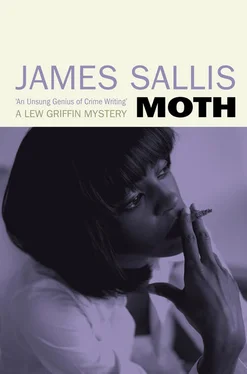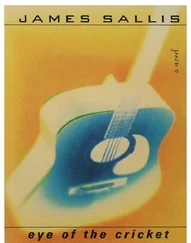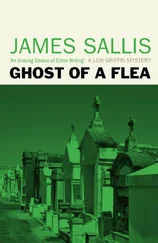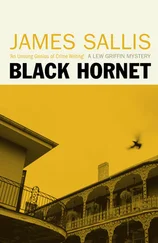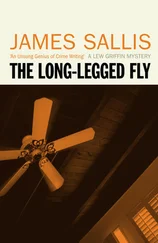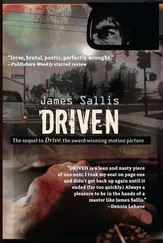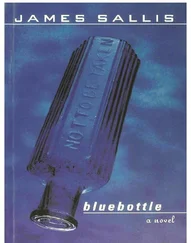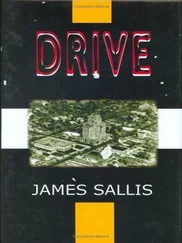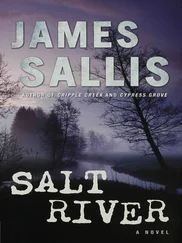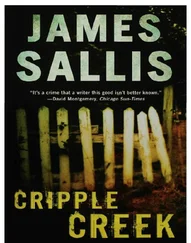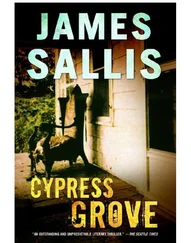James Sallis - Moth
Здесь есть возможность читать онлайн «James Sallis - Moth» весь текст электронной книги совершенно бесплатно (целиком полную версию без сокращений). В некоторых случаях можно слушать аудио, скачать через торрент в формате fb2 и присутствует краткое содержание. Жанр: Криминальный детектив, на английском языке. Описание произведения, (предисловие) а так же отзывы посетителей доступны на портале библиотеки ЛибКат.
- Название:Moth
- Автор:
- Жанр:
- Год:неизвестен
- ISBN:нет данных
- Рейтинг книги:3 / 5. Голосов: 1
-
Избранное:Добавить в избранное
- Отзывы:
-
Ваша оценка:
- 60
- 1
- 2
- 3
- 4
- 5
Moth: краткое содержание, описание и аннотация
Предлагаем к чтению аннотацию, описание, краткое содержание или предисловие (зависит от того, что написал сам автор книги «Moth»). Если вы не нашли необходимую информацию о книге — напишите в комментариях, мы постараемся отыскать её.
Moth — читать онлайн бесплатно полную книгу (весь текст) целиком
Ниже представлен текст книги, разбитый по страницам. Система сохранения места последней прочитанной страницы, позволяет с удобством читать онлайн бесплатно книгу «Moth», без необходимости каждый раз заново искать на чём Вы остановились. Поставьте закладку, и сможете в любой момент перейти на страницу, на которой закончили чтение.
Интервал:
Закладка:
A good question.
A very good question for this fifty-year-old, unsmiling, resolutely unpublic man.
What was I doing?
Besides sitting in a holding cell in West Memphis, Arkansas, that is-home at last, or close enough.
Besides not telling mostly indifferent juniors, seniors and a scatter of grad students about modern French novels-which is what I was supposed to be doing.
The thought occurred to me that I’d disappeared from my school as precipitately and incommunicably as, a few years ago, my son David had vanished from his.
I really was getting far too old for this.
And besides, basically the whole thing just wasn’t any of my business.
And so I sat there, watching dawn lightly brush, then nudge, then fill a single high window, drinking cup after cup of coffee deputies brought me and declining their offer of cigarettes, my mind curving gently inward, backward, toward things long shut away.
David: his final postcard and consummate disappearance, those moments of silence on the phone machine’s tape.
Vicky: red hair drifting in a cloud above me, pale white body opening beneath me, trilled r ’s, unvoiced assents, I can’t do this any longer Lew . Seeing her off and for the last time at the airport as she emplaned for Paris.
LaVerne.
Till the drifting mind fetched up, finally, on a shore of sorts.
I thought of two photos of my parents, the only things I’d kept when Francy and I went through the house after Mom died. After these, taken the year they were married, they became shy; only a handful of snapshots remain, and in them, in every case, my parents are turned, or turning, away from the camera: looking off, averting faces, moving toward the borders of the frame. But here my mother, then in a kind of mirror image my father, sit on the hood of a Hudson Terraplane, so that, were the photos placed side by side, they would be looking into one another’s eyes. And that image-their occupancy of discrete worlds, the connection relying upon careful placement, upon circumstance-seems wholly appropriate in light of their subsequent life together, Chekhov’s precisely wrong and telling detail.
All their silent, ceaseless warfare came later, of course. Here in these photos, momentarily, the world has softened. She is full of life, a plainly pretty woman for whom life is just now beginning. His mixed heritage shows in cheekbones and straight, jet-black hair; his skin is light, like Charlie Patton’s. They are a handsome, a fine, young couple.
As I myself grew older, into my early teens, I began to notice that my father was slowly going out of focus, blurring at the edges, color washing out to the dun grayish-green of early Polaroids. I can’t be sure this is how I saw it at the time; time’s whispers are suspect, memory forever as much poet as reporter, and perhaps this is only the way that, retrospectively, imaginatively, I make sense for now (though a limited sense, true) of what then bewildered me.
My mother by then had already begun her own decline, her own transformation, hardening into a bitter rind of a woman who pushed through the stations of her day as though each moment were unpleasant duty; as though the currencies of joy had become so inflated they could no longer purchase anything of worth.
How had those two young people on the Terraplane ever become the sad, embattled, barricaded couple I grew up with? What terrible, quiet things had happened to them?
How do any of us become what we are, really: so distant a thing from what we set out to be, and seemed?
How, for instance, does a part-time college instructor, part-time novelist who believed he’d put his past behind him where it rightfully belonged (and what he couldn’t put behind him, into his books), come to be sitting in an interrogation room across from a quartet of cops at nine in the morning in West Memphis, Arkansas?
Which is where I was but minutes later.
The guy who seemed to be in charge had oiled-down hair, a bushy mustache and rolled-up sleeves. I felt a moment’s terror that a barbershop quartet had been sent in to interrogate me. Any moment they were going to start singing “The Whiffenpoof Song,” and I’d tell them everything I knew. Hell, I’d tell them things I didn’t know. As a writer, I was good at that.
“Can we get you anything, Mr. Griffin, before we start?”
Had to be the baritone. He and a wiry little guy, probably the tenor, sat at the table. The others sat against the wall behind them on folding chairs. The table between us had nothing on it. Table, floor and walls were spotless, scrubbed. The air smelled faintly of disinfectant and lemon.
“No, but thanks.”
“Then could you explain to us why on the emergency line you represented yourself as a police officer?”
I tried to think of a snappy response. Marlowe certainly would have had one.
“Strictly speaking, I didn’t,” was the best I could do.
“ ‘Officer down,’ I believe you said.”
That kind of set the pace for the whole thing. They’d ask a question and I’d answer it, they’d ask another and circle back to an earlier one. It was a lot like the chants kids use when they’re jumping rope. Or gamelan music.
“I needed help fast. The girl was in bad shape.”
We were all very polite, very businesslike. There were things, practical things, to get done, and we were men of the world. Members of the quartet changed from time to time. Toward the end, two hours or more into the morning, Sergeant Travis of Clarksville’s finest came in and sat against the back wall.
“You went there for a drug buy and the deal went bad,” one of them was saying just then. “We know that, Griffin.”
I looked across at Travis. He shook his head sadly, looked at the floor.
This went on a while, as it had been going on, and eventually Travis stood, nodded to me, and left. I had become a tape loop.
Ten minutes later he walked back in behind a guy in a suit and said, “Come on, Griffin, let’s go.”
I followed him out into a long bare hallway, voices raised and clashing behind us.
“Last I heard, extradition didn’t work like this.”
“All in who and what you know,” Travis said. “Those boys are kind of pissed, right now. They’ve been planning a raid on that house for three weeks. It was finally set to go down tonight. And here you went and spoiled their party. Luckily, Douglas and I went to high school together. Guy in the suit? He’s the chief here. Caught a hundred long passes from that man if I caught one. You play?”
“Hate football.” Didn’t dance, either.
“Look like you could have, easy.”
We were standing outside the station now. I felt strangely weightless. Travis stopped and turned toward me.
“They’re not charging you with anything. But god-al mighty are they pissed.”
“Give me a lift?”
“Be glad to, but you don’t need one.”
He smiled. Handed me an envelope: wallet, pocket contents, keys.
“Your car’s in the lot around back. I had a trustee go out there and bring it in.”
“I don’t suppose you want to tell me how it was that you happened to show up here?”
“Not really. But in my experience, there’s very little in life that just happens. Know what I mean?”
“No. And I don’t guess I’m going to.”
“Doesn’t matter. You’ll be coming back down to Clarksville?”
“I don’t know. Not right away, at any rate. There may be no reason to. First I have to find out about Alouette.”
We’d walked around to the back. I opened the car door and reached to shake his hand.
“Thanks. I appreciate what you’ve done.” Whatever the reasons.
“The girl’s over at Baptist Hospital, tenth floor. Across the bridge, find Union Avenue and you’re almost there. She’s going to be okay, Griffin. For now, anyway.”
Читать дальшеИнтервал:
Закладка:
Похожие книги на «Moth»
Представляем Вашему вниманию похожие книги на «Moth» списком для выбора. Мы отобрали схожую по названию и смыслу литературу в надежде предоставить читателям больше вариантов отыскать новые, интересные, ещё непрочитанные произведения.
Обсуждение, отзывы о книге «Moth» и просто собственные мнения читателей. Оставьте ваши комментарии, напишите, что Вы думаете о произведении, его смысле или главных героях. Укажите что конкретно понравилось, а что нет, и почему Вы так считаете.
